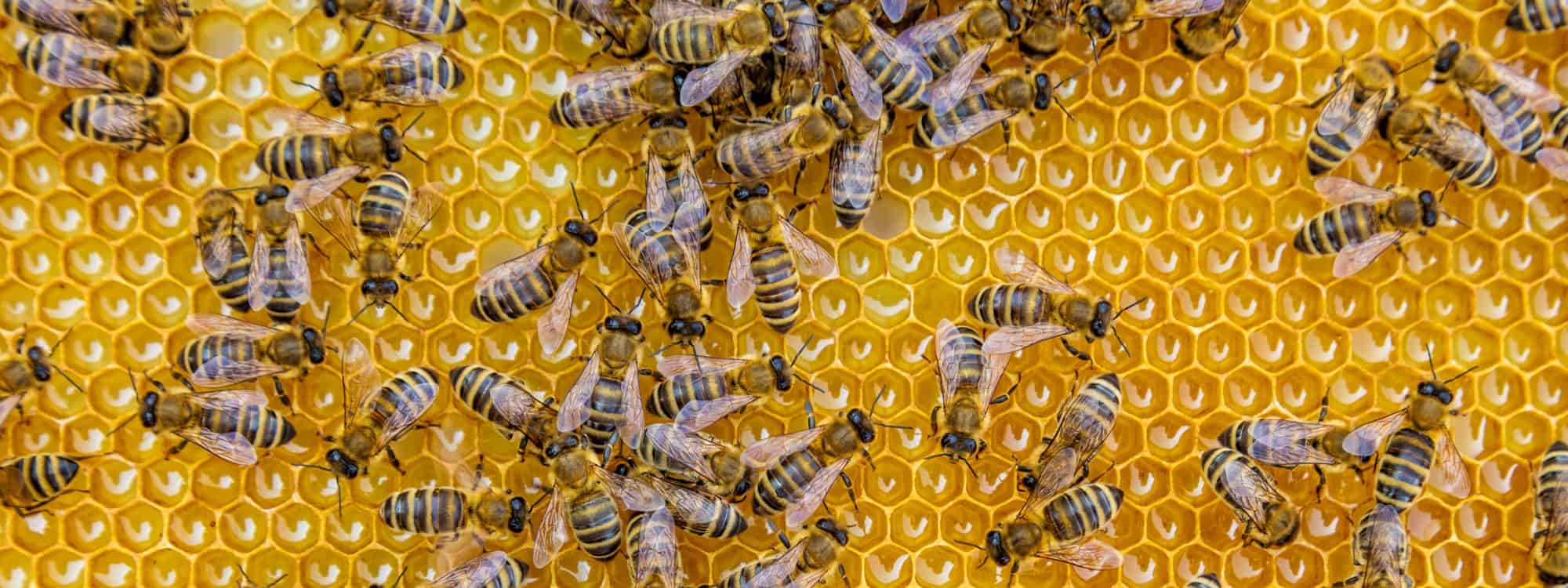Honey Bees
Honey bees, commonly found in Muskoka, are small, social insects typically measuring around 10 to 15 mm in length. They are easily recognizable by their fuzzy, golden-yellow bodies with black bands. Honey bees are known for their essential role in pollination and honey production. Unlike wasps, honey bees have hairy bodies, which help them collect pollen, and they have barbed stingers, which they can only use once before they die. They are generally non-aggressive and will only sting if they feel their hive is threatened.
Habitat:
In Muskoka, honey bees are often kept in hives by beekeepers, although they can also establish wild colonies in tree hollows, wall cavities, or other sheltered locations. These bees are highly social and live in large colonies, which can consist of thousands of individual bees. Honey bee colonies are well-organized, with a single queen, worker bees, and drones. They prefer environments that offer an abundance of flowers for foraging, making gardens, orchards, and wildflower meadows ideal habitats.
Diet:
Honey bees primarily feed on nectar and pollen from flowers. The nectar is converted into honey, which is stored in the hive as a food source for the colony, especially during the winter months. In addition to nectar, honey bees collect pollen, which provides essential proteins and fats for their young. Their diet of floral resources makes them vital pollinators for a wide range of plants, including fruits, vegetables, and wildflowers. Honey bees are crucial for the pollination of many crops in Muskoka, contributing significantly to local food production.
Behavior:
Honey bees are highly social and cooperative within their colonies, communicating through pheromones and the “waggle dance” to share information about food sources. Worker bees are responsible for foraging, tending to the queen, and protecting the hive, while drones’ primary role is reproduction. Honey bee colonies are productive throughout the spring and summer, with foraging intensifying as flowers bloom. Honey bees are generally docile but will defend their hive aggressively if threatened, using their stingers to protect the colony. However, once a bee stings, it dies, so they only do so in self-defense.
Prevention:
To prevent honey bee infestations or unwanted proximity to your home, it is essential to respect their space. Avoid disturbing hives, and if a colony is located near your property, consider contacting a local beekeeper for safe removal or relocation. To minimize attracting bees, avoid leaving sweet foods or sugary drinks outside and ensure garbage is tightly sealed. Honey bees play a vital role in the ecosystem, so promoting coexistence with these valuable pollinators is essential.
Control:
Honey bee control is rarely necessary unless the colony poses a danger due to its location or aggressive behavior. In such cases, professional beekeepers can safely relocate the colony. It’s important to avoid using harmful pesticides, as they can significantly impact honey bee populations, which are already in decline in some areas. By protecting honey bees and encouraging safe relocation practices, homeowners can support local pollination efforts while ensuring their safety.
By understanding the habits and needs of honey bees, Muskoka residents can help preserve these crucial pollinators and benefit from their important work in maintaining a healthy, thriving environment.

